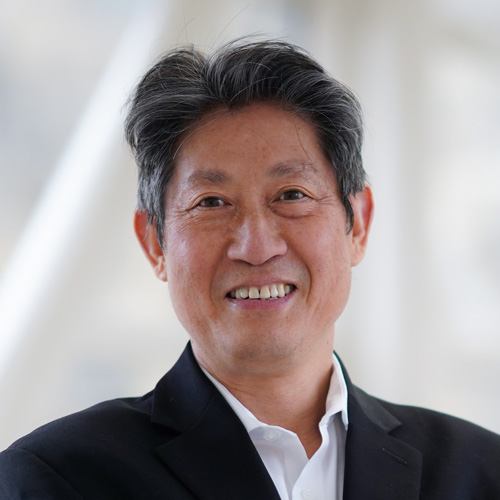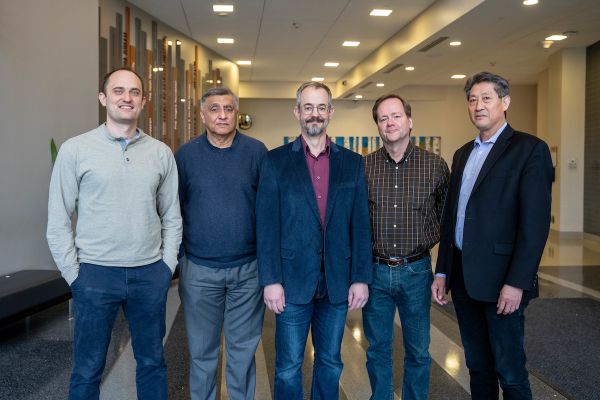Research Interests:
- Stem cell development
- Cancer stem cells
- Cancer cell heterogeneity and plasticity
- Prostate cancer
- Non-coding RNAs and Epigenetics
- Experimental therapeutics
Biography
Dean Tang, PhD, is currently Distinguished Professor and Chair of Department of Pharmacology & Therapeutics at the Roswell Park Comprehensive Cancer Center in Buffalo, NY. He also holds the George Decker Endowed Chair in Developmental Therapeutics. Trained as a Pathologist, Dean obtained his PhD in Cancer Biology in 1994 from Wayne State University (Detroit, MI, USA). In 1998-2000, Dr. Tang pursued a Burroughs-Wellcome senior post-doctoral fellowship with Dr. Martin Raff at the MRC LMCB (University College London, UK) studying stem/progenitor cell development and plasticity. In June 2000, Dr. Tang joined the University of Texas M.D Anderson Cancer Center as a faculty member.
After working at the M.D Anderson for 16 years, Dr. Tang was recruited to Roswell Park in June 2016 to Chair the Department of Pharmacology & Therapeutics and Co-Lead the CCSG Developmental Therapeutics (DT) Program. He’s also the Chair of the Experimental Therapeutics (ET) Graduate Program. For the past ~23 years (since 2002), Dr. Tang and his colleagues have been studying cancer cell heterogeneity and plasticity (with a particular focus on prostate cancer) and their impact on tumor development, progression, metastasis, and therapy resistance.
The lab has been developing novel tools and experimental model systems to therapeutically target the undifferentiated, treatment-reprogrammed, and therapy-resistant prostate cancer stem cells. The Tang lab has performed extensive genetic model- and xenograft-based therapeutic experiments as well as organoid-based high-throughput screening to identify both FDA-approved drugs as well as novel small-molecule inhibitors that can preferentially target AR-/lo PCa stem cells (PCSCs) and CRPC cells. Some of Dr. Tang’s preclinical studies have been translated to early-phase clinical trials (e.g., NCT03751436). Dr. Tang is an elected AAAS member and has published >220 research and reviews papers with current H-index of 81, i10-index of 161 and ~23,000 citations (Google scholar).
Positions
Roswell Park Comprehensive Cancer Center
- Distinguished Professor of Oncology
- Co-Leader, CCSG Developmental Therapeutics Program
- Director, Experimental Therapeutics PhD Track
- Chair – Department of Pharmacology & Therapeutics
- George Decker Endowed Chair in Developmental Therapeutics
Background
Education and Training
- 1994 - PhD - Cancer Biology - Wayne State University Medical School, Detroit, MI
- 1986-1989 - MS - Cancer Biology - Wuhan University School of Medicine, Wuhan, China
Residency
- Oncological Pathology - Wuhan, China
Fellowship
- 1998-2000 – Postdoctoral Fellow – MRC Laboratory for Molecular Cell Biology, London
Professional Experience
- 2016 - present - Department of Pharmacology & Therapeutics, Roswell Park Comprehensive Cancer Center, Buffalo, NY
- 2000-2016 - Department of Epigenetics and Molecular Carcinogenesis, University of Texas M.D Anderson Cancer Center, Houston, TX
Honors & Awards
- 2021 - George Decker Endowed Chair in Developmental Therapeutics, Roswell Park Comprehensive Cancer Center
- 2021 - Co-organizer, the Keystone eSymposia, ‘Stem Cells and Cancer’
- 2016 - Fellow of AAAS (American Association of Advancement of Science)
- 2014 - The Spandidos Publications Award for Outstanding Scientific Achievement
- 2013 - Keynote Speaker, “Cancer Stem Cells: The Mechanisms of Radioresistance and Biomarker Discover Symposium,” Dresden, Germany
- 2012 - Sanofi - Cell Research Outstanding Review Paper Award
- 2007 - The Robert M. Chamberlain Distinguished Mentor Award, The University of Texas M.D. Anderson Cancer Center
- 2003-2007 - American Cancer Society (ACS) Research Scholar
- 1998-2002 - Burroughs Wellcome Fund Hitchings-Elion Award
Research Overview
Our lab research aims to elucidate the fundamental biological principles that govern the generation of tumor cell heterogeneity via cancer stem cells (CSCs) and cancer cell plasticity via epigenetic mechanisms, and to take our newly gained knowledge to translate to the clinic. By focusing on prostate cancer (PCa), we have characterized the biological and tumorigenic properties and identified novel molecular regulators of prostate cancer stem cells (PCSCs). We have recently shown that PCa cell heterogeneity, especially heterogeneity in AR expression, has a great impact on PCa cell response to clinical therapies. This line of research has been translated to a phase I/IIb clinical trial (NCT03751436; Chatta, PI) that treats mCRPC patients with a combination of enzalutamide and the only FDA-approved BCL-2 specific inhibitor venetoclax. The lab has several inter-connected research projects.
1. Investigate normal prostate epithelial cell heterogeneity & hierarchy and PCa cell(s)-of-origin
2. Elucidate PCa cell heterogeneity and plasticity: Roles in therapy resistance, relapse & metastasis
3. Uncover molecular regulators and therapeutic targets of PCSCs and CRPC
4. Dissect PCa cell heterogeneity and immunity & PCa cell coevolution with the TME
5. Develop novel therapeutics and therapeutic combinations to tackle PCa heterogeneity and plasticity
Pharmacology and Therapeutics Lab Members:
- Xiaozhuo (Dalton) Liu, PhD
- Anmbreen Jamroze, PhD
- Rahul Kumar, PhD
- Ruifang (Nancy) Liu, PhD
- Eoghan Connors, M.S
- Shan Wu, PhD candidate
- Moyi Wang, PhD candidate
Featured on CancerTalk
Publications
Representative Publications:
- Kirk JS, Wang J, Tracz A, Long M, Rosario SR, Ji Y, Kumar R, Liu X, Jamroze J, Singh PK, Puzanov I, Chatta G, Cheng Q, Huang J, Wrana JL, Lovell J, Yu H, Liu S, Shen MM, Liu T, Tang DG. Integrated single-cell analysis defines the epigenetic basis of castration-resistant prostate luminal cells. Cell Stem Cell. 31(8):1203-1221, 2024. PMCID: PMC10028794
- Fan T, Xu C, Wu J, Cai Y, Cao W, Shen H, Zhang M, Zhu H, Yang J, Zhu Z, Ma X, Ren J, Huang L, Li Q, Tang Y, Yu B, Chen C, Xu M, Wang Q, Xu Z, Chen F, Liang S, Zhong Z, Jamroze A, Tang DG*, Li H*, Dong C*. Lipopolyplex-formulated mRNA cancer vaccine elicits strong neoantigen-specific T cell responses and antitumor activity. Sci Adv. 2024 Oct 11;10(41):eadn9961. Epub 2024 Oct 11. PMCID: PMC11468906 *Co-corresponding authors
- Serotonin sets up neutrophil extracellular traps to promote neuroendocrine prostate cancer metastasis in the liver. Tang DG.J Clin Invest. 2025 Apr 15;135(8):e191687. doi: 10.1172/JCI191687. eCollection 2025 Apr 15.PMID: 40231471
- Kirk JS, Wang J, Long M, Rosario S, Tracz A, Ji Y, Kumar R, Liu X, Jamroze A, Singh PK, Puzanov I, Chatta G, Cheng Q, Huang J, Wrana JL, Lovell J, Yu H, Liu S, Shen MM, Liu T, Tang DG. Integrated single-cell analysis defines the epigenetic basis of castration-resistant prostate luminal cells. Cell Stem Cell. 2024 Jun 14:S1934-5909(24)00185-1. doi: 10.1016/j.stem.2024.05.008. Online ahead of print.PMID: 38878775
- Dingxiao Zhang, Qiang Hu, Xiaozhuo Liu, Yibing Ji, Hsueh-Ping Chao, Yan Liu, Amanda Tracz, Jason Kirk, Silvia Buonamici, Ping Zhu, Jianmin Wang, Song Liu, Dean G. Tang. Intron retention is a hallmark and spliceosome represents a therapeutic vulnerability in aggressive prostate cancer. Nat Commun 11, 2089 (2020). PMID: 32350277
- Li Q, Liu B, Chao HP, Ji Y, Lu Y, Mehmood R, Jeter C, Chen T, Moore JR, Li W, Liu C, Rycaj K, Tracz A, Kirk J, Calhoun-Davis T, Xiong J, Deng Q, Huang J, Foster BA, Gokhale A, Chen X, Tang DG. LRIG1 is a pleiotropic androgen receptor-regulated feedback tumor suppressor in prostate cancer. Nat Commun. 2019 Dec 2;10(1):5494. doi: 10.1038/s41467-019-13532-4. PMID: 31792211; PMCID: PMC6889295.
- Li Q, Deng Q, Chao HP, Liu X, Lu Y, Lin K, Liu B, Tang GW, Zhang D, Tracz A, Jeter C, Rycaj K, Calhoun-Davis T, Huang J, Rubin MA, Beltran H, Shen J, Chatta G, Puzanov I, Mohler JL, Wang J, Zhao R, Kirk J, Chen X, Tang DG. Linking prostate cancer cell AR heterogeneity to distinct castration and enzalutamide responses. Nat Commun. 2018 Sep 6;9(1):3600. doi: 10.1038/s41467-018-06067-7. PMID: 30190514; PMCID: PMC6127155.
- Zhang D, Jeter C, Gong S, Tracz A, Lu Y, Shen J, Tang DG. Histone 2B-GFP Label-Retaining Prostate Luminal Cells Possess Progenitor Cell Properties and Are Intrinsically Resistant to Castration. Stem Cell Reports. 2018 Jan 9;10(1):228-242. doi: 10.1016/j.stemcr.2017.11.016. Epub 2017 Dec 21. PMID: 29276153; PMCID: PMC5768933.
- Liu C, Liu R, Zhang D, Deng Q, Liu B, Chao HP, Rycaj K, Takata Y, Lin K, Lu Y, Zhong Y, Krolewski J, Shen J, Tang DG. MicroRNA-141 suppresses prostate cancer stem cells and metastasis by targeting a cohort of pro-metastasis genes. Nat Commun. 2017 Jan 23;8:14270. doi: 10.1038/ncomms14270. PMID: 28112170; PMCID: PMC5264244.
- Chen X, Li Q, Liu X, Liu C, Liu R, Rycaj K, Zhang D, Liu B, Jeter C, Calhoun-Davis T, Lin K, Lu Y, Chao HP, Shen J, Tang DG. Defining a Population of Stem-like Human Prostate Cancer Cells That Can Generate and Propagate Castration-Resistant Prostate Cancer. Clin Cancer Res. 2016 Sep 1;22(17):4505-16. doi: 10.1158/1078-0432.CCR-15-2956. Epub 2016 Apr 8. PMID: 27060154; PMCID: PMC5010458.
- Zhang D, Park D, Zhong Y, Lu Y, Rycaj K, Gong S, Chen X, Liu X, Chao HP, Whitney P, Calhoun-Davis T, Takata Y, Shen J, Iyer VR, Tang DG. Stem cell and neurogenic gene-expression profiles link prostate basal cells to aggressive prostate cancer. Nat Commun. 2016 Feb 29;7:10798. doi: 10.1038/ncomms10798. PMID: 26924072; PMCID: PMC4773505.
- Qin J, Liu X, Laffin B, Chen X, Choy G, Jeter CR, Calhoun-Davis T, Li H, Palapattu GS, Pang S, Lin K, Huang J, Ivanov I, Li W, Suraneni MV, Tang DG. The PSA(-/lo) prostate cancer cell population harbors self-renewing long-term tumor-propagating cells that resist castration. Cell Stem Cell. 2012 May 4;10(5):556-69. doi: 10.1016/j.stem.2012.03.009. PMID: 22560078; PMCID: PMC3348510.
- Liu C, Kelnar K, Liu B, Chen X, Calhoun-Davis T, Li H, Patrawala L, Yan H, Jeter C, Honorio S, Wiggins JF, Bader AG, Fagin R, Brown D, Tang DG. The microRNA miR-34a inhibits prostate cancer stem cells and metastasis by directly repressing CD44. Nat Med. 2011 Feb;17(2):211-5. doi: 10.1038/nm.2284. Epub 2011 Jan 16. PMID: 21240262; PMCID: PMC3076220.
- Laffin B, Tang DG. An Old Player on a New Playground: Bmi-1 as a Regulator of Prostate Stem Cells. Cell Stem Cell. 2010 Dec 3;7(6):639-40. doi: 10.1016/j.stem.2010.11.019. PMID:21112554.
- Chandra D, Bratton SB, Person MD, Tian Y, Martin AG, Ayres M, Fearnhead HO, Gandhi V, Tang DG. Intracellular nucleotides act as critical prosurvival factors by binding to cytochrome C and inhibiting apoptosome. Cell. 2006 Jun 30;125(7):1333-46. doi: 10.1016/j.cell.2006.05.026. PMID: 16814719.
- Tang DG, Tokumoto YM, Apperly JA, Lloyd AC, Raff MC. Lack of replicative senescence in cultured rat oligodendrocyte precursor cells. Science. 2001 Feb 2;291(5505):868-71. doi: 10.1126/science.1056780. Epub 2001 Jan 18. PMID: 11157165.


